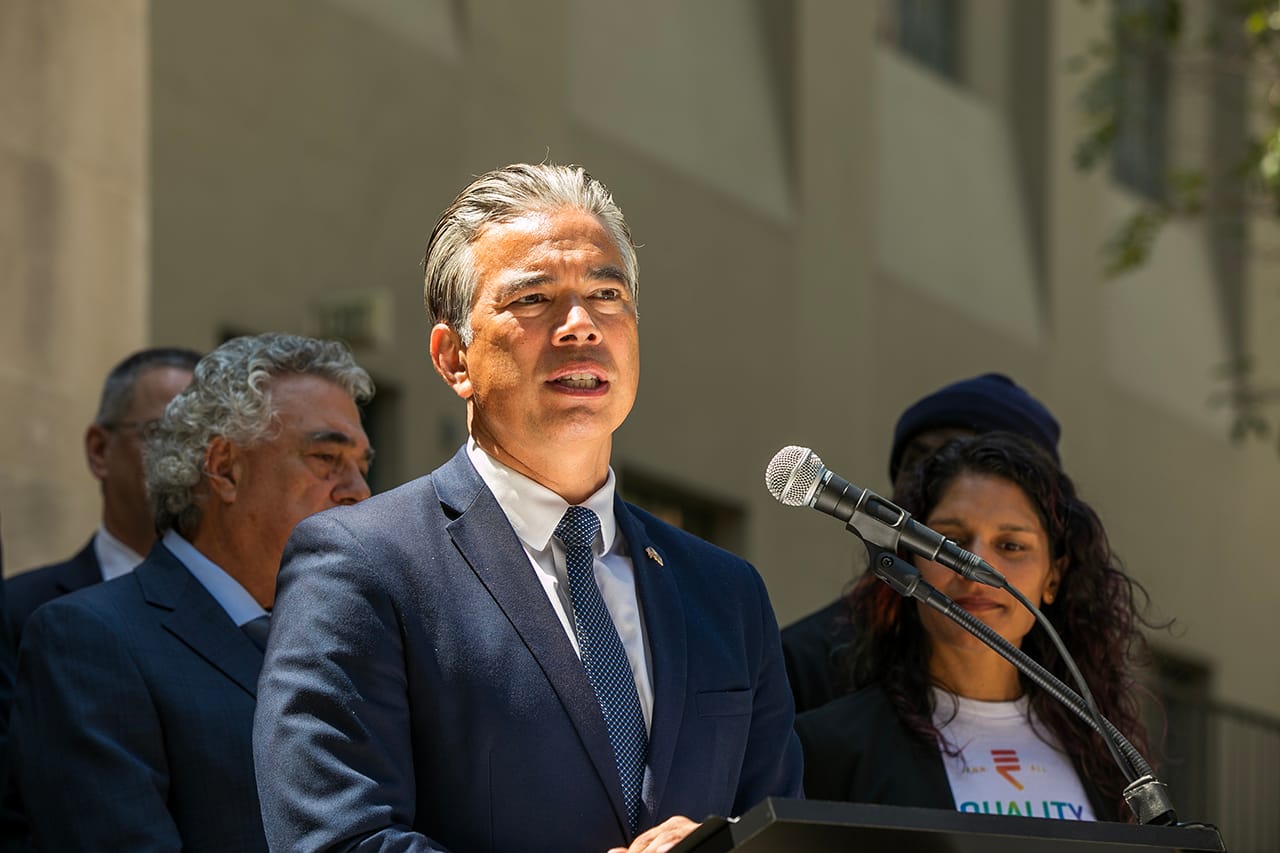Court blocks Trump’s plan to use California Medicaid data for immigration enforcement
A federal judge granted a preliminary injunction blocking the Trump Administration from using California’s Medicaid data for immigration enforcement, siding with Attorney General Rob Bonta and a multistate coalition that argued the policy change violated federal law.
California Attorney General Rob Bonta announced Tuesday that the U.S. District Court for the Northern District of California has granted a preliminary injunction in a lawsuit brought by California and a coalition of states against the U.S. Department of Health and Human Services (HHS) and the U.S. Department of Homeland Security (DHS). At issue is a policy change granting Immigration and Customs Enforcement (ICE) unfettered access to Medicaid patient data for immigration enforcement.
The court found that HHS and DHS likely violated the Administrative Procedure Act (APA) by reversing long-standing policies without a reasoned decision-making process. For more than a decade, both agencies had maintained and publicized policies protecting Medicaid patient information from use in immigration enforcement. The abrupt change in 2025 was implemented without engaging relevant stakeholders, considering reliance interests, or assessing the potential disruption to Medicaid programs.
As a result of the injunction, DHS is barred from using Medicaid data obtained from the plaintiff states for immigration enforcement purposes, including data already acquired. HHS is barred from sharing Medicaid data from those states with DHS for the same purpose. This preliminary relief will remain in place until the conclusion of litigation or 14 days after the agencies complete a lawful policy review that complies with the APA.
Background
Historical Policy on Medicaid Data
Since at least 2013, Immigration and Customs Enforcement (ICE) has had a policy against using Medicaid patient data for immigration enforcement purposes, and the Centers for Medicare & Medicaid Services (CMS) has long limited the use of patients’ personal information to administering health care programs. These policies were publicly communicated to states, health care providers, and Medicaid patients, fostering reliance throughout the Medicaid system.
Policy Shift in 2025
In June 2025, CMS began sharing Medicaid patient data with ICE for immigration enforcement purposes. The following month, in July 2025, CMS and ICE formalized this arrangement through a data-sharing agreement. The agreement granted ICE unfettered access to all information about all Medicaid patients in the United States—including U.S. citizens —although ICE appeared to be primarily seeking current address information for individuals in the country unlawfully.
As the court noted in its ruling,
“CMS appears to have granted ICE unfettered access to all information about all Medicaid patients in the United States, whether citizens or noncitizens.”
Parties Involved
The plaintiffs are a coalition of 20 states, led by California, that filed suit on July 1, 2025, to block the new data-sharing policy. The states argue that the change violates federal law, undermines patient trust, and causes fear and confusion that could lead eligible individuals — particularly noncitizens — to disenroll from or avoid enrolling in Medicaid. The defendants are the U.S. Department of Health and Human Services (HHS) and the U.S. Department of Homeland Security (DHS), which oversees ICE. California Attorney General Rob Bonta serves as the lead plaintiff in the case.

Legal Proceedings
Claims Raised
The plaintiff states challenged the new data-sharing policy on multiple grounds. Central to their argument was that the decision by HHS to give ICE unrestricted access to Medicaid data, and DHS’s use of that data for immigration enforcement, violated the Administrative Procedure Act (APA). They contended the agencies acted in an arbitrary and capricious manner by abruptly reversing longstanding protections without following a reasoned decision-making process.
The states also argued that the policy change qualified as a “legislative rule” under the APA and therefore required notice-and-comment rulemaking. Additionally, they raised a Spending Clause claim, asserting that the federal government’s actions interfered with state control over Medicaid administration and funding.
Court’s Findings
The court found the record strongly suggested that no reasoned decision-making process took place before HHS and DHS reversed their long-standing policies. “It was incumbent upon the agencies to carry out a reasoned decisionmaking process before changing them,” the judge wrote. “The record in this case strongly suggests that no such process occurred.”
While noting that federal law may allow DHS to obtain certain information from agencies like HHS, the court emphasized that such a significant change — especially one affecting states, providers, and vulnerable patients — required careful consideration of reliance interests, potential disruption to Medicaid, and whether limits could be placed on the scope of the data shared.
The court concluded that the states had demonstrated a likelihood of success on their APA claim and were likely to suffer irreparable harm if the policy remained in effect during litigation. It held that the balance of hardships and public interest weighed in favor of granting preliminary relief.
However, the court denied the request to require immediate notice-and-comment rulemaking, stating the current record did not establish that such rulemaking was legally required for this type of policy change. This denial was without prejudice, leaving the issue open for reconsideration. The court also declined to rule on the Spending Clause claim at this stage, calling it “moot” in light of the APA ruling.
Scope of the Injunction
The court issued a preliminary injunction preventing DHS from using Medicaid data obtained from the plaintiff states for immigration enforcement purposes, including any data already acquired. It also prohibited HHS from sharing Medicaid data from those states with DHS for that purpose.
The injunction applies to: California, Arizona, Colorado, Connecticut, Delaware, Hawaii, Illinois, Maine, Maryland, Massachusetts, Michigan, Minnesota, Nevada, New Jersey, New Mexico, New York, Oregon, Rhode Island, Vermont, and Washington.
Duration and Compliance Requirements
The injunction will remain in place until the earlier of:
- The conclusion of the litigation, or
- Fourteen days after both HHS and DHS complete a reasoned decision-making process (or rulemaking, if necessary) that considers the relevant policy tradeoffs and legal factors identified by the court.
If the agencies complete this process before the case ends, they must notify the plaintiff states within 24 hours and file a status report with the court within 48 hours.
Political and Public Reaction
Statement from Attorney General Rob Bonta
Following the court’s ruling, California Attorney General Rob Bonta characterized the decision as a critical safeguard for patient privacy and an important check on federal overreach. He condemned the Trump Administration’s reversal of long-standing protections, stating:
“The Trump Administration’s move to use Medicaid data for immigration enforcement upended longstanding policy protections without notice or consideration for the consequences. It sowed a culture of fear that threatens our Medicaid system, caused chaos for states and providers, and created a chilling effect for patients seeking vital emergency medical care.”
Bonta emphasized that the injunction not only stops future data transfers but also prevents use of any data already shared:
“Today’s preliminary injunction rightfully blocks any sharing of California's Medicaid data for immigration enforcement for now — and ensures any of the data that’s already been shared is not being used for immigration enforcement purposes.”
He framed the lawsuit and the injunction as part of a broader defense against what he described as an “inhumane anti-immigrant crusade” by the President:
“As the President continues to overstep his authority in his inhumane anti-immigrant crusade, this is a clear reminder that he remains bound by the law.”
Concerns Highlighted in the Lawsuit
The multistate coalition, led by California, argued that the policy change created widespread fear and confusion among noncitizens and their families. According to the states, these conditions were causing eligible individuals to disenroll from or refuse to enroll in emergency Medicaid, despite being entitled to such coverage. This, they asserted, placed additional financial strain on states and safety-net hospitals that are required to provide federally mandated emergency healthcare services.
Coalition Composition
In addition to California, the coalition included the attorneys general of Arizona, Colorado, Connecticut, Delaware, Hawaii, Illinois, Massachusetts, Maine, Maryland, Michigan, Minnesota, Nevada, New Jersey, New Mexico, New York, Oregon, Rhode Island, Vermont, and Washington.
Medicaid and Medi-Cal Context
National Medicaid Overview
Created in 1965, Medicaid serves as a critical source of health insurance for lower-income individuals and certain underserved populations, including children, pregnant women, individuals with disabilities, and seniors. While states must meet threshold federal statutory requirements, each participating state designs and administers its own program, tailoring eligibility standards and coverage options to the needs of its residents.
As of January 2025, a combined 78.4 million people were enrolled in Medicaid and the Children’s Health Insurance Program (CHIP) nationwide, according to an August 12th press release from California Attorney General Rob Banta.
California’s Medi-Cal Program
California’s Medicaid program, known as Medi-Cal, provides healthcare coverage for one out of every three Californians. This includes more than two million noncitizens, a category that encompasses green card holders, refugees, individuals with Temporary Protected Status, recipients of Deferred Action for Childhood Arrivals (DACA), and others.
Not all noncitizens are eligible for federally funded Medi-Cal services. To address this gap, California uses state-only funds to operate a version of Medi-Cal that covers all eligible residents regardless of immigration status. This policy ensures that qualifying individuals can access healthcare coverage even if they do not meet federal immigration eligibility criteria for Medicaid.
Implications
For Immigration Enforcement
The preliminary injunction removes a newly established tool from the federal government’s immigration enforcement efforts. By halting both the sharing and use of Medicaid patient data from the plaintiff states, the ruling forces the Department of Homeland Security (DHS) and Immigration and Customs Enforcement (ICE) to pause any planned operations that relied on this information. While the court acknowledged that immigration enforcement is a legitimate federal interest, it determined that delaying access to this particular data source is outweighed by the potential harm to states, providers, and patients caused by the sudden policy reversal.
For Medicaid Administration
The ruling reinforces the expectation that patient data collected for healthcare administration will not be used for unrelated federal enforcement purposes without a clear, well-reasoned policy shift. This safeguard helps maintain trust between Medicaid participants and program administrators. The plaintiffs argued that the policy change created a chilling effect on enrollment, especially among noncitizens, which could reduce access to vital healthcare services. The injunction helps preserve current enrollment levels and ensures that Medicaid can continue serving its intended populations without additional fear or confusion.
For Federal-State Relations
The decision underscores the importance of state reliance interests in federal program administration. States, providers, and patients had operated for years under assurances that Medicaid data would not be used for immigration enforcement. By requiring a reasoned decision-making process before any such change, the court reaffirmed the role of states as critical partners in administering Medicaid and signaled that abrupt shifts in federal policy must account for state-level impacts.
Next Steps
For HHS and DHS
The preliminary injunction requires the U.S. Department of Health and Human Services (HHS) and the U.S. Department of Homeland Security (DHS) to engage in a reasoned decision-making process before implementing any policy that allows the sharing and use of Medicaid data for immigration enforcement. This process must consider:
- The longstanding reliance interests of states, providers, and patients.
- The potential disruption to Medicaid operations.
- Whether the scope of data access should be limited (e.g., restricting ICE to address information for individuals unlawfully present, rather than full access to all Medicaid patient records).
- Any relevant policy tradeoffs or legal considerations identified in the court’s ruling.
If rulemaking is deemed necessary as part of this process, it must be completed in compliance with applicable administrative law requirements.
Once HHS and DHS complete their review or rulemaking, they must:
- Notify the plaintiff states within 24 hours.
- File a status report with the court within 48 hours.
For Plaintiff States
The plaintiff states will continue to litigate the case, seeking a permanent resolution that protects Medicaid data from being used for immigration enforcement without adequate process. They will also monitor agency compliance with the injunction and assess whether any future federal actions meet the legal standards outlined by the court.
Duration of Relief
The preliminary injunction will remain in effect until the earlier of:
- The conclusion of the litigation, or
- Fourteen days after HHS and DHS complete the required decision-making process (or rulemaking, if necessary) consistent with the court’s order.
In Summary
The ruling offers only temporary relief, but it marks a significant legal setback for the Trump Administration’s policy shift. With the injunction in place, HHS and DHS must conduct a lawful review before any renewed effort to share Medicaid data for immigration enforcement — a process that could determine the future balance between federal immigration priorities and state-administered healthcare protections.








